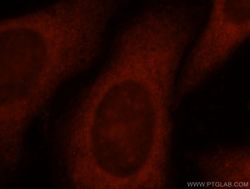Antibody data
- Antibody Data
- Antigen structure
- References [13]
- Comments [0]
- Validations
- Western blot [1]
- Immunocytochemistry [1]
Submit
Validation data
Reference
Comment
Report error
- Product number
- 17355-1-AP - Provider product page

- Provider
- Proteintech Group
- Proper citation
- Proteintech Cat#17355-1-AP, RRID:AB_2273677
- Product name
- ACTL7A antibody
- Antibody type
- Polyclonal
- Description
- ACTL7A antibody (Cat. #17355-1-AP) is a rabbit polyclonal antibody that shows reactivity with human, mouse, rat and has been validated for the following applications: IF, IHC, WB,ELISA.
- Reactivity
- Human, Mouse, Rat
- Host
- Rabbit
- Conjugate
- Unconjugated
- Isotype
- IgG
- Vial size
- 20ul, 150ul
Submitted references Deletion of ACTRT1 is associated with male infertility as sperm acrosomal ultrastructural defects and fertilization failure in human.
A novel homozygous TSGA10 missense variant causes acephalic spermatozoa syndrome in a Pakistani family.
Novel ACTL7A variants in males lead to fertilization failure and male infertility.
A novel homozygous mutation in ACTL7A leads to male infertility.
ACROSIN deficiency causes total fertilization failure in humans by preventing the sperm from penetrating the zona pellucida.
Actl7a deficiency in mice leads to male infertility and fertilization failure.
Loss of perinuclear theca ACTRT1 causes acrosome detachment and severe male subfertility in mice.
The perinuclear theca protein Calicin helps shape the sperm head and maintain the nuclear structure in mice.
Pathogenic variant in ACTL7A causes severe teratozoospermia characterized by bubble-shaped acrosomes and male infertility.
Novel bi-allelic variants in ACTL7A are associated with male infertility and total fertilization failure.
Homozygous pathogenic variants in ACTL9 cause fertilization failure and male infertility in humans and mice.
Loss of SPACA1 function causes autosomal recessive globozoospermia by damaging the acrosome-acroplaxome complex.
Impact of mismatch-repair deficiency on the colorectal cancer immune microenvironment.
Zhang Q, Jin H, Long S, Tang X, Li J, Liu W, Han W, Liao H, Fu T, Huang G, Chen S, Lin T
Human reproduction (Oxford, England) 2024 May 2;39(5):880-891
Human reproduction (Oxford, England) 2024 May 2;39(5):880-891
A novel homozygous TSGA10 missense variant causes acephalic spermatozoa syndrome in a Pakistani family.
Khan K, Zhang X, Dil S, Khan I, Unar A, Ye J, Zeb A, Zubair M, Shah W, Zhang H, Khan MA, Wu L, Xu B, Ma H, Wen Z, Shi Q
Basic and clinical andrology 2024 Feb 5;34(1):4
Basic and clinical andrology 2024 Feb 5;34(1):4
Novel ACTL7A variants in males lead to fertilization failure and male infertility.
Wang M, Zhou J, Long R, Jin H, Gao L, Zhu L, Jin L
Andrology 2023 Nov 22;
Andrology 2023 Nov 22;
A novel homozygous mutation in ACTL7A leads to male infertility.
Zhou X, Xi Q, Jia W, Li Z, Liu Z, Luo G, Xing C, Zhang D, Hou M, Liu H, Yang X, Luo Y, Peng X, Wang G, Zou T, Zhu L, Jin L, Zhang X
Molecular genetics and genomics : MGG 2023 Mar;298(2):353-360
Molecular genetics and genomics : MGG 2023 Mar;298(2):353-360
ACROSIN deficiency causes total fertilization failure in humans by preventing the sperm from penetrating the zona pellucida.
Hua R, Xue R, Liu Y, Li Y, Sha X, Li K, Gao Y, Shen Q, Lv M, Xu Y, Zhang Z, He X, Cao Y, Wu H
Human reproduction (Oxford, England) 2023 Jun 1;38(6):1213-1223
Human reproduction (Oxford, England) 2023 Jun 1;38(6):1213-1223
Actl7a deficiency in mice leads to male infertility and fertilization failure.
Zhou X, Liu Z, Jia W, Hou M, Zhang X
Biochemical and biophysical research communications 2022 Oct 1;623:154-161
Biochemical and biophysical research communications 2022 Oct 1;623:154-161
Loss of perinuclear theca ACTRT1 causes acrosome detachment and severe male subfertility in mice.
Zhang XZ, Wei LL, Zhang XH, Jin HJ, Chen SR
Development (Cambridge, England) 2022 Jun 15;149(12)
Development (Cambridge, England) 2022 Jun 15;149(12)
The perinuclear theca protein Calicin helps shape the sperm head and maintain the nuclear structure in mice.
Zhang XZ, Wei LL, Jin HJ, Zhang XH, Chen SR
Cell reports 2022 Jul 5;40(1):111049
Cell reports 2022 Jul 5;40(1):111049
Pathogenic variant in ACTL7A causes severe teratozoospermia characterized by bubble-shaped acrosomes and male infertility.
Dai J, Chen Y, Li Q, Zhang T, Zhou Q, Gong F, Lu G, Zheng W, Lin G
Molecular human reproduction 2022 Jul 29;28(8)
Molecular human reproduction 2022 Jul 29;28(8)
Novel bi-allelic variants in ACTL7A are associated with male infertility and total fertilization failure.
Wang J, Zhang J, Sun X, Lin Y, Cai L, Cui Y, Liu J, Liu M, Yang X
Human reproduction (Oxford, England) 2021 Nov 18;36(12):3161-3169
Human reproduction (Oxford, England) 2021 Nov 18;36(12):3161-3169
Homozygous pathogenic variants in ACTL9 cause fertilization failure and male infertility in humans and mice.
Dai J, Zhang T, Guo J, Zhou Q, Gu Y, Zhang J, Hu L, Zong Y, Song J, Zhang S, Dai C, Gong F, Lu G, Zheng W, Lin G
American journal of human genetics 2021 Mar 4;108(3):469-481
American journal of human genetics 2021 Mar 4;108(3):469-481
Loss of SPACA1 function causes autosomal recessive globozoospermia by damaging the acrosome-acroplaxome complex.
Chen P, Saiyin H, Shi R, Liu B, Han X, Gao Y, Ye X, Zhang X, Sun Y
Human reproduction (Oxford, England) 2021 Aug 18;36(9):2587-2596
Human reproduction (Oxford, England) 2021 Aug 18;36(9):2587-2596
Impact of mismatch-repair deficiency on the colorectal cancer immune microenvironment.
Zhang Y, Sun Z, Mao X, Wu H, Luo F, Wu X, Zhou L, Qin J, Zhao L, Bai C
Oncotarget 2017 Oct 17;8(49):85526-85536
Oncotarget 2017 Oct 17;8(49):85526-85536
No comments: Submit comment
Supportive validation
- Submitted by
- Proteintech Group (provider)
- Main image

- Experimental details
- mouse testis tissue were subjected to SDS PAGE followed by western blot with 17355-1-AP(ACTL7A antibody) at dilution of 1:800
- Sample type
- tissue
Supportive validation
- Submitted by
- Proteintech Group (provider)
- Main image

- Experimental details
- Immunofluorescent analysis of HepG2 cells, using ACTL7A antibody 17355-1-AP at 1:25 dilution and Rhodamine-labeled goat anti-rabbit IgG (red).
- Sample type
- cell line
 Explore
Explore Validate
Validate Learn
Learn Western blot
Western blot ELISA
ELISA